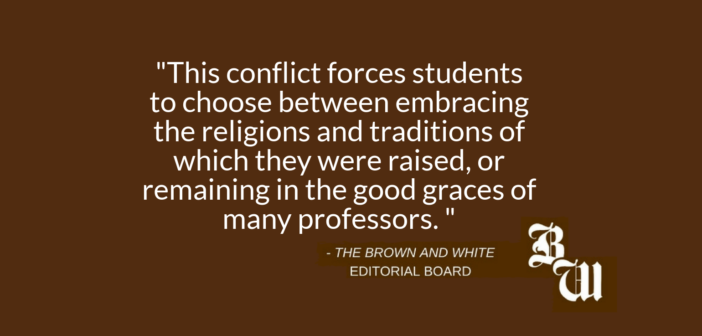Grumbling stomachs replaced exam jitters as Lehigh’s population of Jewish students sat in class on the holiest day of the year, Yom Kippur, a day of fasting. Instead of spending the day in synagogue or with their families, students were sitting in class preparing to take an exam scheduled on a holiday.
This is just one example of how the university’s lack of recognition of both federal and religious holidays impacts the student body.
Per the university Accommodation Policy, students are granted exemption from classes on days where attending class could potentially inhibit ability to celebrate or observe. This, however, does not prevent students from missing valuable lectures or exams, which are often extremely time consuming and difficult to make up. This is especially difficult when required to do so in every course taking place on the holiday.
“Faculty should be aware that in the fall semester students from various traditions may request accommodations as they refrain from work or ordinary secular activities, and this may include time spent traveling home for holiday observance,” the policy states.
Yet, semester after semester, this conflict forces students to choose between embracing the religions and traditions on which they were raised, or remaining in the good graces of many professors.
Lehigh recently held class on Martin Luther King Day. While the school did offer opportunities to commemorate the holiday, a memorial luncheon in St. Peter’s Church and an upcoming presentation by Anita Hill on Feb. 7, many students called into question why classrooms were open when restaurants, post offices and banks shut their doors.
This causes the Lehigh student body to question whether or not these policies are fair and raises discussion about if these policies disregard and overlook the historical and religious importance of the holidays.
While Lehigh tries to combat this questioning, students are still put at an academic disadvantage and face great difficulties in efforts to travel home to celebrate with friends and family, especially when many religious holidays fall over the course of multiple days.
While Lehigh has a longer winter break than many other comparable institutions, the lack of days off for holidays is not a reasonable trade-off for a few extra days of an already long time away.
Acclimating to university life already requires students to forego many of their typical activities and traditions. By holding classes on holidays that possess great traditional value, such as Good Friday, Labor Day and Veterans Day, students forego an additional part of their identity when they are not able to observe in the ways that they have throughout their lives.
While not acknowledging the impact that this has on its students, Lehigh does make accommodations and exceptions for the desires of its faculty and staff. Faculty members that choose to attend work on holidays are offered additional compensation, and faculty that does not attend has the opportunity to receive paid time off. While the acknowledgement of the needs of our staff is undeniably positive, this also represents a blatant disregard for the well-being of students, who are not offered such accommodations, despite what the university claims.
Regardless of the administration’s lack of legitimate accommodations, the Lehigh community at large provides many opportunities for students to connect with their faith and traditions while exploring new ones as well. Organizations such as Chabad at Lehigh, CRU, Hillel Society, Hindu Students Organization, Muslim Student Association and many more provide outlets for students of any faith, as well as outlets for students who do not associate with a specific faith at all. Regardless, the Lehigh community yearns to ensure that there is a space in which each student, despite religious affiliation, has a place in which they can feel included and accepted.






Comment policy
Comments posted to The Brown and White website are reviewed by a moderator before being approved. Incendiary speech or harassing language, including comments targeted at individuals, may be deemed unacceptable and not published. Spam and other soliciting will also be declined.
The Brown and White also reserves the right to not publish entirely anonymous comments.
2 Comments
Before the age of Snowflakes and diversity, the reason to go to Lehigh was to get a good, all be it, expensive four year education with a useful degree. That doesn’t seem to be the case anymore. What has happened? Is it the fault of admissions, faculty or administration?
“,,,as well as outlets for students who do not associate with a specific faith at all. Regardless, the Lehigh community yearns to ensure that there is a space in which each student, despite religious affiliation, has a place in which they can feel included and accepted.”
Things were much simpler when Asa started Lehigh. I think all students are included and accepted in the classes in which they are enrolled at the scheduled time and place. Trying to be all things to all people may result in Lehigh being not much to many. I can foresee the push for rights of those not associated with a specific faith may end up in in no exceptions for anyone, in the interest of fairness of course.
If the traditions have any meaning, a possible four year absence from them by attending Lehigh should tend to make the desire to continue them after graduation even stronger. If this does not satisfy, there is probably a university that will suit better. The world sucks,either be an optimistic realist a masochist or unhappy.